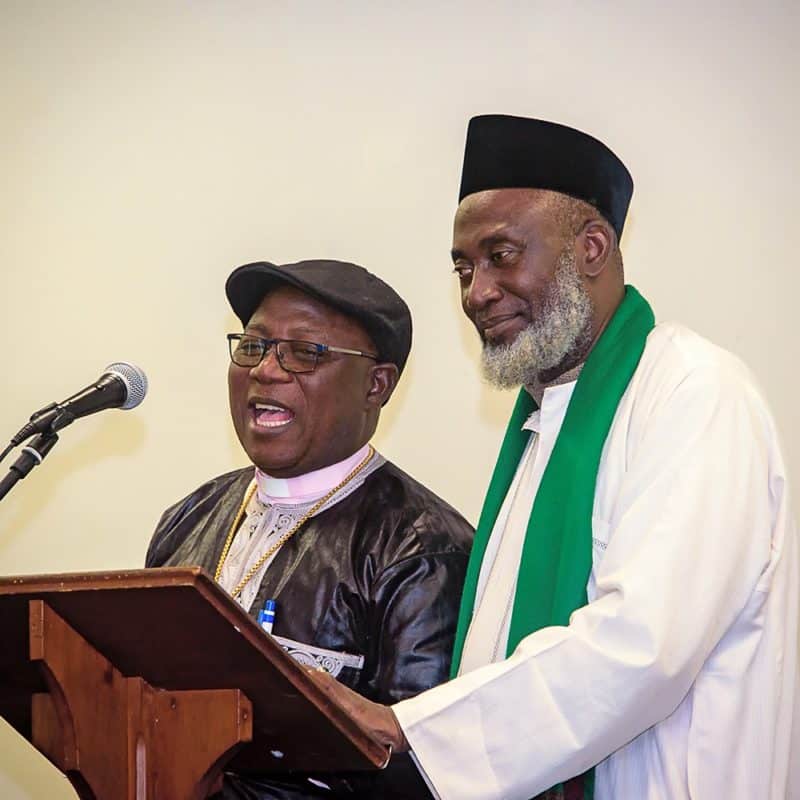by BEATE MATTHIES and RUTH CLEAVER
On August 27, around 140 people gathered in the Fickling Centre, Three
Kings, Auckland to hear the remarkable story of “The Imam and the Pastor”
from Nigeria, hosted by the Auckland Inter-Faith Council. Imam Muhammed Ashafa and Pastor James Wuye come from Kaduna, in northern Nigeria, where the Christian and Muslim populations have been embroiled in violent conflict for decades.
The two had been speaking in New Zealand centres and the Auckland talk was the last before they returned to Nigeria.
In his talk, Imam Ashafa began by expressing his admiration for the way New Zealand handled itself in the wake of the March 15 massacre. He then explained that religious leaders can be “good, bad, or ugly”, and the bad ones use misinterpretation of religious texts to radicalise and wrongly influence people to violence. He acknowledged that he had been manipulated in that way as a young man. He had hated Christianity and all
things Western. He then explained the extraordinary process by which he and Pastor Wuye went from being enemies to brothers.
As leaders of opposing militias and community leaders within their respective groups, they had a chance meeting in 1995 in the Governor’s house. They had been invited in order to promote vaccinations among their communities. At this occasion, a journalist who knew both of them put their hands together and said to them that they could initiate positive change in the country if they wanted to. They absolutely didn’t trust each other, and the imam said he wanted to use this brief interaction as a way to make contact so he could kill his enemy, Pastor Wuye! However, when the imam attended prayer that week, he heard a passage from the Quran that encouraged believers to make friends of their enemies. Something spoke to his conscience, and he began to read in the scriptures the need for forgiveness, to abandon hatred, and that in the name of God there should be love not violence.
Forgiveness
Over time he decided to become an agent for peace and he set out to win the trust of Pastor Wuye. The imam had lost his spiritual mentor and two cousins in battles with the Christians, and Pastor Wuye had lost his hand in a fight with the imam’s group.
With such deep scars, it took several years and many tentative encounters before they could completely forgive each other and begin to work together for the good of their communities. Imam Ashafa noted that it was hate
— in the name of their religions — which turned into love — in the name of the same religions. Both men came to realise that, by connecting with the true values of their faith, it was not possible to hate in the name of God.
Pastor Wuye explained that, due to political problems, there are serious divisions within their society along religious lines. As a Christian, he had grown up with a very strong hatred of Muslims. He talked about how it took three years for him to even begin to trust Imam Ashafa. It took longer before they could really accept each other and work through their differences.
He had the audience laughing as he explained how sometimes he and the imam would be out speaking about inter-religious dialogue and the need for harmony, but after leaving the programme they wouldn’t speak to each other because of some argument! Pastor Wuye told the audience that “forgiveness can disarm your enemy”. Once he was able to forgive, he felt free.
Some important work they are doing is trying to re-integrate religious fighters back into their respective communities. The fighters have caused much fear and terrible violence, so even after an individual reforms and renounces his violent ways, the community may not accept the person back. Other work they are doing has been to draft a bill in Nigeria about religious tolerance and hate speech, which will be presented to the government. Following their talks, the audience asked questions. Michael Wood, MP, asked how to grow trust; they responded that it takes time, and sharing each other’s suffering and hard times is one way to strengthen the bond.
The imam said that when the pastor’s mother died, he brought his wife and
family to sit and grieve with the pastor’s family, and that act of common humanity helped open the pastor’s heart. Another person asked if they had experienced retaliation from their own faith group. Imam Ashafa explained
that at times he had to hide, to save his life. One time he was accused before the sharia court for compromising Islam. To defend himself he presented a 26-page paper proving that the Quran promoted good relations between Christians and Muslims. The charges were dropped.
The final message was that there is a need to practise forgiveness as the antidote to anger. People may feel anger but should not act on it. Where there is conflict, bring the parties together and work it out. If people can’t forgive, it is like taking poison and expecting the other one to die! Letting go of anger is the way to freedom; by controlling anger, people are becoming
more human.
A koha was raised to support the Centre for Inter-Faith Dialogue in Kaduna, and the guests were also presented with a framed photo of the Auckland skyline to remember the occasion.

[…] Pastor and imam share remarkable story The Power of Forgiveness – Peace & Understanding among different Faiths Tags: Interfaith […]